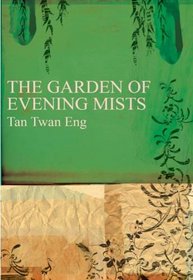Beautiful! I've read two books by this author now and absolutely LOVE his writing style.
Loved this book. Not only is it beautifully-written, but it tells a great story about a part of the world that I did not know much about. With his first two books, Tan Twan Eng has been long and short-listed for the Mann Booker Prize. He was awarded the Mann Asian Prize for this book.
I didn't love this novel, but I stuck with it because I felt it offered some valuable insights in a place and a period of history that I knew little about.
I felt that it was trying to do a bit too much, but perhaps that's an "occupational hazard" for a novel about Malaysia -- a place where the local population, and local history, have been overlaid with layers and layers of colonists, invaders and in-comers, every layer offering the possibility of fabulous diversity, and shocking violence. The central and secondary characters must, for the purposes of the novel, be either witnesses or representatives of as many of those layers as possible, as they play out in the mid-20th century: Yun Ling is a Malaysian of Chinese ethnicity, who grows up in a relatively privileged bubble, suffers terribly during the Japanese invasion, recovers from her traumas after the War to become a Judge, contributing to the rebuilding of Malaysian society, which then puts her directly at odds with the Insurgency which attempted to challenge the Malaysia that had been constructed by privileged colonists and in-comers.
So far, so good -- Yun Ling has to be a bit of a "Zelig," she must experience and witness all this to be our eyes and ears on this journey. Where I did begin to baulk was at the major plot thread in which she decides to commemorate her sister, murdered by the Japanese in an internment camp, by constructing a formal Japanese garden, and to this end becomes involved with a mysterious exile, rumored to be the former Head Gardener to the Emperor of Japan, driven away by some disgrace. This felt a bit forced -- nice to think that a woman would commemorate her beloved sister with a cultural icon of the country that killed her. Nice to think that, eventually, she could overcome her rage and grief to have a warm, intimate relationship with a man who might be an agent of that country. Would it ever really happen?
So, well worth reading, but I felt that it did test my patience a bit.
I also had one stylistic quibble: Eng seemed to think that he could build in a sense of the diversity and foreignness of his characters by embedding one foreign word in each sentence they spoke. I don't think I would have minded so much if the word had been something untranslatable, or something so unique to the culture (a food dish, an animal, an item of clothing or jewellery, whatever) that only that word would do. But no -- often as not, the word was bland and ordinary, and it just felt like a rather patronising way of reminding us that this person wasn't a native English speaker. End of rant.
I felt that it was trying to do a bit too much, but perhaps that's an "occupational hazard" for a novel about Malaysia -- a place where the local population, and local history, have been overlaid with layers and layers of colonists, invaders and in-comers, every layer offering the possibility of fabulous diversity, and shocking violence. The central and secondary characters must, for the purposes of the novel, be either witnesses or representatives of as many of those layers as possible, as they play out in the mid-20th century: Yun Ling is a Malaysian of Chinese ethnicity, who grows up in a relatively privileged bubble, suffers terribly during the Japanese invasion, recovers from her traumas after the War to become a Judge, contributing to the rebuilding of Malaysian society, which then puts her directly at odds with the Insurgency which attempted to challenge the Malaysia that had been constructed by privileged colonists and in-comers.
So far, so good -- Yun Ling has to be a bit of a "Zelig," she must experience and witness all this to be our eyes and ears on this journey. Where I did begin to baulk was at the major plot thread in which she decides to commemorate her sister, murdered by the Japanese in an internment camp, by constructing a formal Japanese garden, and to this end becomes involved with a mysterious exile, rumored to be the former Head Gardener to the Emperor of Japan, driven away by some disgrace. This felt a bit forced -- nice to think that a woman would commemorate her beloved sister with a cultural icon of the country that killed her. Nice to think that, eventually, she could overcome her rage and grief to have a warm, intimate relationship with a man who might be an agent of that country. Would it ever really happen?
So, well worth reading, but I felt that it did test my patience a bit.
I also had one stylistic quibble: Eng seemed to think that he could build in a sense of the diversity and foreignness of his characters by embedding one foreign word in each sentence they spoke. I don't think I would have minded so much if the word had been something untranslatable, or something so unique to the culture (a food dish, an animal, an item of clothing or jewellery, whatever) that only that word would do. But no -- often as not, the word was bland and ordinary, and it just felt like a rather patronising way of reminding us that this person wasn't a native English speaker. End of rant.




